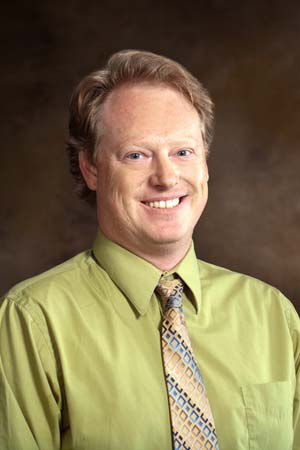FAYETTEVILLE, Ark. – Jeff Wolchok, an assistant professor in the Department of Biomedical Engineering at the University of Arkansas, spoke at a March 29 press conference with Arkansas Gov. Asa Hutchinson on how seed funding from the Arkansas Biosciences Institute has helped scientists across the state to win over half a million dollars in external funding.
Wolchok told the media the process of acquiring funding for scientific research isn't an easy one.
"Gone are the days when you can expect to receive funding just for an idea or an interesting question," he said. "You really now need a solid track record with preliminary data and demonstrated productivity in your area of research, which then [raises] the question: How do you get funding to collect the preliminary data that you need in order to get funding?"
The answer, Wolchok said, lies in institutions like the Arkansas Biosciences Institute, which began in 1998 when state healthcare leaders were looking for a productive way to disperse Arkansas' share of a nationwide tobacco settlement. They decided to create the ABI as a conduit for research that could help reduce or prevent smoking-related illnesses. Arkansas voters endorsed the proposed Tobacco Settlement Proceeds Act of 2000, and the Arkansas Legislature enacted the provisions of that proposal as Acts 1569 through 1580 of 2001.
Part of that legislation established the Arkansas Biosciences Institute as a consortium of five research institutions: the University of Arkansas at Fayetteville, the University of Arkansas System’s statewide Division of Agriculture, the University of Arkansas for Medical Sciences, Arkansas State University and Arkansas Children’s Hospital.
Over the years, researchers like Wolchok have worked through the institute to leverage the initial tobacco settlement funding into considerably greater research funding.
"We've used this seed funding to support students, to develop animal models, to either build or purchase important instruments that we've used to collect preliminary data that we then use to publish foundational papers," Wolchok said.
This foundational work, he said, has now enabled him to receive a half billion dollars in funding from the National Institutes of Health and the National Science Foundation during the past couple of years.
Over the past three years, Wolchok estimated that the faculty members of the Department of Biomedical Engineering have been able to leverage Arkansas Biosciences Institute funding to receive approximately $4 million in federally funded grants, which benefit not only the faculty members themselves, but the multitudes of undergraduate and graduate students that the department recruits, teaches, and trains.
As a result of the lab experience they receive through grant funding, Wolchok explained, U of A's biomedical engineering students "are more competitive [candidates] for graduate school, medical school, and industry positions."
The Arkansas Biosciences Institute has helped scientists across the state of Arkansas to win $508 million in total external funding, from both private and public sources.
Contacts
Elizabeth DeMeo, media specialist
Department of Biomedical Engineering
479-575-4667,
Camilla Shumaker, director of communications
College of Engineering
479-575-5697,
